Fleurs du Mal Magazine


Or see the index

Verlorenes Lied
Ich bin arm und habe nichts.
Nichts! Garnichts!
Nichts als lange Haare –
Bin zweiundzwanzig Jahre –
Sind rotes Gold, meine Haare,
Sagen die Kaufleut’ mir.
Ich bin arm und habe nichts.
Nichts! Garnichts!
Nichts als gemalte Brauen –
Fluch den ehrbaren Frauen! –
Sind tintenschwarz, meine Brauen,
Sagen die Schreiber mir.
Ich bin arm und habe nichts.
Nichts! Garnichts!
Nichts als kecke Blicke –
Weißt du, wem ich sie schicke ? –
Sind scharfes Schrot, meine Blicke,
Sagen die Jäger mir.
Ich bin arm und habe nichts.
Nichts! Garnichts!
Nichts als reife Lippen –
Tugend fährt über Klippen –
Sind kirschensüß, meine Lippen,
Sagen die Gärtner mir.
Ich bin arm und habe nichts.
Nichts! Garnichts!
Nichts als geschmeidige Sohlen –
Ei, in der Schenke das Johlen! –
Sind zum Tanzen gemacht, meine Sohlen,
Sagen die Spielleut’ mir.
Ich bin arm und habe nichts.
Nichts! Garnichts!
Nichts als weiße Glieder –
Blankes Gold lockert mein Mieder –
Sind Flammen der Lust, meine Glieder,
Sagst heute nacht du mir.
Ich bin arm und habe nichts.
Nichts! Garnichts!
Nichts als ein Leben in Schande,
Einen Tod am Straßenrande –
Einst in zerlumptem Gewande
Scharrt man mich ein im Sande.
Wo ? Sagt keiner mir.
Ich bin arm und habe nichts.
Nichts! Garnichts!
Nichts als die heimliche Zähre –
Daß ich so arm nicht wäre! –
Nur meine Dirnenehre!
Vom Strauch fällt die tausendste Beere;
Fault sie, wer sucht nach ihr ?
Sterb’ ich, wer weint nach mir?
Gertrud Kolmar
(1894 – 1943)
Verlorenes Lied
•fleursdumal.nl magazine
More in: *War Poetry Archive, Archive K-L, Archive K-L, Kolmar, Gertrud
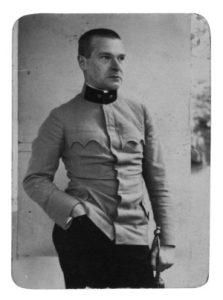
In Venedig
Stille in nächtigem Zimmer.
Silbern flackert der Leuchter
Vor dem singenden Odem
Des Einsamen;
Zaubrisches Rosengewölk.
Schwärzlicher Fliegenschwarm
Verdunkelt den steinernen Raum
Und es starrt von der Qual
Des goldenen Tags das Haupt
Des Heimatlosen.
Reglos nachtet das Meer.
Stern und schwärzliche Fahrt
Entschwand am Kanal.
Kind, dein kränkliches Lächeln
Folgte mir leise im Schlaf.
Georg Trakl
(1887 – 1914)
In Venedig
• fleursdumal.nl magazine
More in: *War Poetry Archive, - Archive Tombeau de la jeunesse, Archive S-T, Archive S-T, Expressionism, Expressionisme, Trakl, Georg, Trakl, Georg

Soldatenmädchen
Und wenn du Männer zwingen willst,
So mußt du rasch dich rüsten
Und, eh’ im West der Schnee noch schmilzt,
Marschier’n nach Frankreichs Küsten.
Und wenn du Mädchen zwingen willst,
So weck’ nur dein Gelüsten,
Und ruh’ heut’ nacht, daß du es stillst,
An meinen weißen Brüsten.
Und was der Leute Mund drob’ red’t,
Den Spott will ich ertragen;
Wenn dir der Feind nicht widersteht,
Wie sollt’s dein Lieb wohl wagen ?
Ein heißes Herz ist noch kein Fehl,
Ein’ tapfre Seel’ kein Schaden,
Und wenn sich fanden Herz und Seel’,
Wird uns der Himmel gnaden.
Denn so ist dein und mein Geschick:
Dir schuf der Schmied die Waffen;
Den ros’gen Mund, den dunklen Blick,
Die hat mir Gott geschaffen.
Der Schuster hat die Schuh’ gemacht,
Die deinen Weg betraten,
Vom Schneider hab’ ich meine Tracht,
Mein Kindlein vom Soldaten.
Gertrud Kolmar
(1894 – 1943)
Soldatenmädchen
•fleursdumal.nl magazine
More in: *War Poetry Archive, Archive K-L, Archive K-L, Kolmar, Gertrud

Der Brief
Ein Fetzen Weh, vom Wind daher gefegt,
Das war er nun.
Ich hab’ ihn still ins heil’ge Buch gelegt,
Zu ruhn – zu ruhn—–
Und die vergilbten Blätter schlössen ihn
So linde ein,
Wie Totenhülle, weißer denn Jasmin,
Der braune Schrein.
So fern der Unrast, die da draußen tost,
Hat er geruht.
Und war der Klage voll und gab mir Trost
Er war so gut—–
Gertrud Kolmar
(1894 – 1943)
Der Brief
•fleursdumal.nl magazine
More in: *War Poetry Archive, Archive K-L, Archive K-L, Kolmar, Gertrud

Vorfrühling
In dieser Märznacht trat ich spät aus meinem Haus.
Die Straßen waren aufgewühlt von Lenzgeruch und grünem Saatregen.
Winde schlugen an. Durch die verstörte Häusersenkung ging ich weit hinaus
Bis zu dem unbedeckten Wall und spürte: meinem Herzen schwoll ein neuer Takt entgegen.
In jedem Lufthauch war ein junges Werden ausgespannt.
Ich lauschte, wie die starken Wirbel mir im Blute rollten.
Schon dehnte sich bereitet Acker. In den Horizonten eingebrannt
War schon die Bläue hoher Morgenstunden, die ins Weite führen sollten.
Die Schleusen knirschten. Abenteuer brach aus allen Fernen.
Ueberm Kanal, den junge Ausfahrtwinde wellten, wuchsen helle Bahnen,
In deren Licht ich trieb. Schicksal stand wartend in umwehten Sternen.
In meinem Herzen lag ein Stürmen wie von aufgerollten Fahnen.
Ernst Stadler
(1883 – 1914)
Vorfrühling
•fleursdumal.nl magazine
More in: *War Poetry Archive, - Archive Tombeau de la jeunesse, Archive S-T, Archive S-T, Stadler, Ernst
Under a Future Sky is a gathering of generations, a performance with ghosts anchored in Brynn Saito’s journey with her father to the desert prison where, over 80 years ago, her grandparents met and made a life.
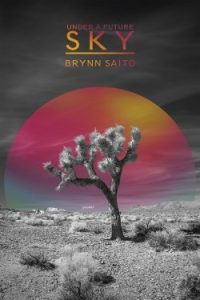 Born of a personal ache, an unquenchable desire to animate the shadow archive, Saito’s journey unfolds in lyric correspondences and epistolary poems that sing with rage, confusion, and, ultimately, love. In these works, descendants of wartime incarceration exchange dreams, mothers become water goddesses, and a modern daughter haunts future ruins. To enter this book is to enter the slipstream of nonlinear time, where mystical inclinations, yellow cedars, and sisterhood make a balm for trauma’s scars. Altogether, the work enacts a dialogue between the past and the present; the radical ancestor and the future child; and the desert prison and the family garden, where Saito’s father diligently gathers stones.
Born of a personal ache, an unquenchable desire to animate the shadow archive, Saito’s journey unfolds in lyric correspondences and epistolary poems that sing with rage, confusion, and, ultimately, love. In these works, descendants of wartime incarceration exchange dreams, mothers become water goddesses, and a modern daughter haunts future ruins. To enter this book is to enter the slipstream of nonlinear time, where mystical inclinations, yellow cedars, and sisterhood make a balm for trauma’s scars. Altogether, the work enacts a dialogue between the past and the present; the radical ancestor and the future child; and the desert prison and the family garden, where Saito’s father diligently gathers stones.
Brynn Saito is the author of Power Made Us Swoon (2016) and The Palace of Contemplating Departure (2013), winner of the Benjamin Saltman Poetry Award from Red Hen Press and a finalist for the Northern California Book Award. She has received grant support from Densho, Hedgebrook, and the Santa Fe Arts Institute. Her poems have appeared in the New York Times and American Review among other journals and anthologies. She was a finalist for the Paterson Poetry Prize and the Milt Kessler Poetry Book Award. Brynn lives in Fresno, CA, where she is an Assistant Professor at California State University, Fresno and co-director of Yonsei Memory Project.
Brynn teaches in the MFA program at California State University, Fresno. She’s co-editing with Brandon Shimoda an anthology of poetry written by descendants of the Japanese American / Nikkei incarceration, forthcoming in 2025 from Haymarket Books.
Under a Future Sky
by Brynn Saito
112 pages
August 15, 2023
ISBN-13 978-1636281070
Publisher: Red Hen Press
Hardcover
€20,99
•fleursdumal.nl magazine
More in: #Editors Choice Archiv, *War Poetry Archive, - Book News, - Bookstores, Archive S-T, Archive S-T, Racism
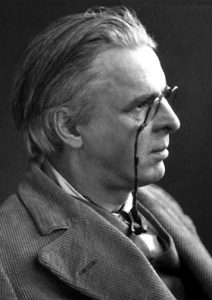
‘Easter 1916’.
Too long a sacrifice
Can make a stone of the heart.
O when may it suffice?
That is Heaven’s part, our part
To murmur name upon name,
As a mother names her child
When sleep at last has come
On limbs that had run wild.
What is it but nightfall?
No, no, not night but death;
Was it needless death after all?
W.B. Yeats
(1865—1939)
‘Easter 1916’
• fleursdumal.nl magazine
More in: *War Poetry Archive, Archive Y-Z, Archive Y-Z, Yeats, William Butler
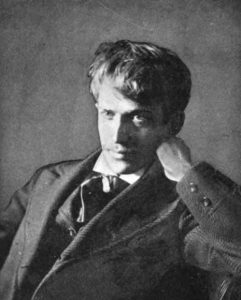
XVIII
In Heaven,
Some little blades of grass
Stood before God.
“What did you do?”
Then all save one of the little blades
Began eagerly to relate
The merits of their lives.
This one stayed a small way behind
Ashamed.
Presently God said:
“And what did you do?”
The little blade answered: “Oh, my lord,
“Memory is bitter to me
“For if I did good deeds
“I know not of them.”
Then God in all His splendor
Arose from His throne.
“Oh, best little blade of grass,” He said.
Stephen Crane
(1871 – 1900)
In Heaven XVIII
• fleursdumal.nl magazine
More in: *War Poetry Archive, Archive C-D, Archive C-D, Stephen Crane

Death
A spirit sped
Through spaces of night;
And as he sped, he called,
“God! God!”
He went through valleys
Of black death-slime,
Ever calling,
“God! God!”
Their echoes
From crevice and cavern
Mocked him:
“God! God! God!”
Fleetly into the plains of space
He went, ever calling,
“God! God!”
Eventually, then, he screamed,
Mad in denial,
“Ah, there is no God!”
A swift hand,
A sword from the sky,
Smote him,
And he was dead.
Stephen Crane
(1871 – 1900)
Death. A spirit sped
•fleursdumal.nl magazine
More in: *War Poetry Archive, Archive C-D, Archive C-D, Stephen Crane
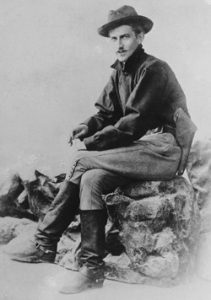
I saw a man
pursuing the horizon
I saw a man pursuing the horizon;
Round and round they sped.
I was disturbed at this;
I accosted the man.
“It is futile,” I said,
“You can never —”
“You lie,” he cried,
And ran on.
Stephen Crane
(1871 – 1900)
I saw a man pursuing the horizon
• fleursdumal.nl magazine
More in: *War Poetry Archive, Archive C-D, Archive C-D, Stephen Crane

Do not weep, maiden, for war is kind
Do not weep, maiden, for war is kind.
Because your lover threw wild hands toward the sky
And the affrighted steed ran on alone,
Do not weep.
War is kind.
Hoarse, booming drums of the regiment,
Little souls who thirst for fight,
These men were born to drill and die.
The unexplained glory flies above them,
Great is the battle-god, great, and his kingdom—
A field where a thousand corpses lie.
Do not weep, babe, for war is kind.
Because your father tumbled in the yellow trenches,
Raged at his breast, gulped and died,
Do not weep.
War is kind.
Swift, blazing flag of the regiment,
Eagle with crest of red and gold,
These men were born to drill and die.
Point for them the virtue of slaughter,
Make plain to them the excellence of killing
And a field where a thousand corpses lie.
Mother whose heart hung humble as a button
On the bright splendid shroud of your son,
Do not weep.
War is kind.
Stephen Crane
(1871 – 1900)
Do not weep, maiden, for war is kind
from: War is Kind
•fleursdumal.nl magazine
More in: *War Poetry Archive, Archive C-D, Archive C-D, Stephen Crane
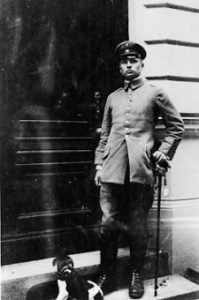
Gedicht über Nachtwirkungen
Noch nicht Tag! Die fratzenhafte Nacht
hat mich Stück für Stück entzweigerissen.
Wehe Striemen drücken mir die Kissen,
jede Falte hat mich wund gemacht.
Und der Träume quälerische Schwere:
Wollust, Ekel, Schmerzen, Tränen, Mord,
treibt mein Herz auf einem dunklen Meere
wie ein purpurrotes Segel fort.
Bin ein zitternd Geflecht von Nerven,
allem Bösen in die Hand gegeben,
Und die Schatten sind wie Messerschärfen,
die von meinem Zucken trunken leben.
Und ich möchte in das Dunkel schrein.
Aber meine Stimme ist nicht mehr.
Wilder Bilder ewige Wiederkehr,
stumm, gestaltlos, haltlos muss ich sein!
Hans Ehrenbaum-Degele
(1889 – 1915)
Gedicht über Nachtwirkungen
• fleursdumal.nl magazine
More in: #Experimental Poetry Archive, *War Poetry Archive, - Archive Tombeau de la jeunesse, Archive E-F, Archive E-F, Expressionism, Modernisme
Thank you for reading Fleurs du Mal - magazine for art & literature